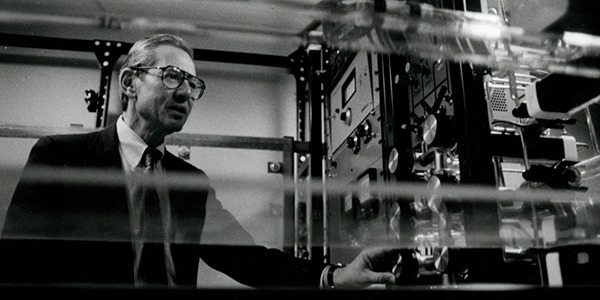UW Bioengineering was founded as the UW Center for Bioengineering by Dr. Robert Rushmer in 1967. Dr. Rushmer was initially known for many biomedical inventions, including the first treadmills for cardiac testing, the hemodialysis shunt, and Doppler ultrasound instruments.
With the Center for Bioengineering, Dr. Rushmer aimed to develop a joint research enterprise of the UW College of Engineering and UW School of Medicine to study the cardiovascular system.
As its research foci expanded, the Center received the ability to grant PhD degrees in 1984. Undergraduate courses were added in 1985. The Center became the Department of Bioengineering in 1997.
The UW Bioengineering bachelor’s degree program was approved in 2000; the bachelor’s degree program was accredited by the Accreditation Board for Engineering and Technology (ABET) in 2008 (retroactive to 2006).
In 2006, the department moved into the new William H. Foege Building, a 265,000 sq. ft. research facility adjacent to Seattle’s Portage Bay that includes offices, laboratories, and support facilities.
Learn more about UW Bioengineering’s history
Read about some of the department’s achievements, notable dates and leadership through the decades in this article.
Interesting facts about UW Bioengineering’s history
- The department was scattered all over UW’s campus before construction of the William H. Foege Building was completed in 2006. Plans to build a dedicated building for the Center for Bioengineering were made in 1968 but never panned out.
- Gerald Pollack and Lee Huntsman are UW Bioengineering’s longest-tenured faculty members; both arrived in 1968.
- UW Bioengineering’s first PhD graduate, Jay Rubinstein, is currently a faculty member in the department. Dr. Rubinstein is well known in the field of hearing research and as a pioneer cochlear implant technology.
- Historical strengths of UW Bioengineering lie in imaging, biomaterials, and molecular engineering. The department received a Whitaker development award in 1989 which led to major growth in molecular engineering research. In 1996, the department established UWEB, an NSF Engineering Research Center dedicated to the study of biomaterials that heal.
- One of UW Bioengineering’s core faculty, Lee Huntsman, served as both UW Provost and President – he was Provost from 1996 to 2003, and Acting President from 2003 to 2004.
- Former chair of UW Bioengineering, Yongmin Kim, is currently President of POSTECH University in South Korea.
- UW Bioengineering alumni include a Luce Scholar (Jesse Burk-Rafel, BS, 2010), and a Rhodes Scholar (Cameron Turtle, BS, 2012).



